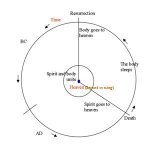.
What he described to me about his Christian walk sounded very much like mine. Very devoted and committed; very knowledgeable about the bible.
I noticed you said his Christian walk "seemed" to be very much like yours, very devoted and committed (or so it seemed). You can also have a lot of head knowledge about the Bible and even act like a Christian without truly being born again. People that I talked with who claimed to have renounced their faith described themselves as previously having a Christian walk and were at one time very devoted and committed as well,
*yet when I pressed them to explain to me how they became a Christian and what it means to be saved through faith, they could not give me a sufficient answer.* I'm sure that Judas Iscariot looked like the real deal to the rest of the disciples, yet Jesus knew his heart and referred to him as an
unbelieving, unclean devil who would betray Him (John 13:10-11; John 6:64-71). People can sound very convincing, yet not truly be the real deal. We must be discerning and not gullible.
Saying that such persons like this were never saved in the first place seems pointless and contradicts the parable of the sower of seed. In two cases, the seed takes root and grows, but to no lasting avail.
Saying that such persons like this were never saved in the first place is not pointless at all and does not contradict the parable of the sower of seed. Are you sure that in two cases, the seed
takes root and grows? Luke 8:13 - But the ones on the rock are those who, when they hear, receive the word with joy; and these have
no root, who believe for a while and in time of temptation fall away. The shallow ground hearer is contrasted with that of the "good ground" hearer, who's heart was "good" and "honest." Thus, his heart was "not good," being like the soil to which it corresponds, being
"shallow" or "rocky," lacking sufficient depth. People who hear and receive the word with joy (emotional response) and believe (in a shallow way) without a good and honest heart, and
without having "root" do not experience real salvation. But the ones on the rock are those who, when they hear, receive the word with joy; and these have
no root.." Problem from the start. Temporary shallow belief that was not firmly rooted or established from the start
"has no root" represents rocky soil. Then we see the results of this.
Temporary shallow belief that has no root, lacks moisture, produces no fruit and withers away is not saving belief.
John has portrayed people as "believing" who are clearly not saved. There is a stage in the progress of belief in Jesus that
"falls short of genuine or consummated belief resulting in salvation." See John 2:23-25 (where their "belief" is clearly
superficial in nature); John 8:31,40,45-46 (where the Jews who were
said to have "believed in him" turn out to be
slaves to sin [v. 34],
indifferent to Jesus’ word [v. 37],
children of the devil [v. 44],
liars [v. 55],
and guilty of setting out to stone the one they have professed to believe in (v. 59). After Jesus’ teaching we read in 6:60 that "many of his disciples . . . said," ‘This is a difficult statement; who can listen to it?’ These are the very so called "disciples" who Jesus says
"do not believe" (John 6:64). They also walked with Him no more. They did not continue. If we
continue in His word, then we demonstrate that we are
TRULY His disciples (John 8:31). Those who
fail to continue in His word demonstrate that they are
NOT TRULY His disciples.
In regards to the thorny soil, the word was
choked out before reaching it's desired goal, making it
[unfruitful]. The word is choked and therefore does not produce a renewed spiritual life in the person; "the anxieties of the age and the pleasures of wealth chokes the message. The worries of life and the delusions of wealth have the effect of stifling the word/gospel, such that the person
does not bear the fruit of salvation. Neither the stony ground hearer or the thorny ground hearer was fruitful. Put a stop to the growth of the word and it
gives no fruit (Bible in Basic English). The potential to eventually become established and produce fruit was there, but the word was
choked out before reaching it's desired goal. It (the seed, the word) became unfruitful
(produces nothing, proves unfruitful, does not produce fruit, yields nothing), because the growth of the word was
choked. In the Complete Jewish Bible we read, Now the seed sown among thorns stands for someone who hears the message,
but it is choked by the worries of the world and the deceitful glamor of wealth, so that it produces nothing. Nothing amounts to nothing and nothing was mentioned about it ever producing something. In both cases, faith without works is dead.
In
CONTRAST, we read in Matthew 13:23 - "And the one on whom seed was sown on the
good soil, this is the man who
hears the word and understands it; who
INDEED BEARS FRUIT and brings forth,
some a hundredfold, some sixty, and some thirty." *Only the 4th soil produced crops of any size.* I suppose the question still remains, "can this forth soil eventually become fruitless?" I have to conclude that if this were possible, why didn't Christ include such a scenario before concluding? There is mention of a difference in the size of the crops, but no consequences or warnings are given to the lesser producers.
Only the 4th soil was referred to as "good ground" and produced a crop (fruit) and there is NO MENTION OF CHOKING OR WITHERING THEREAFTER.
